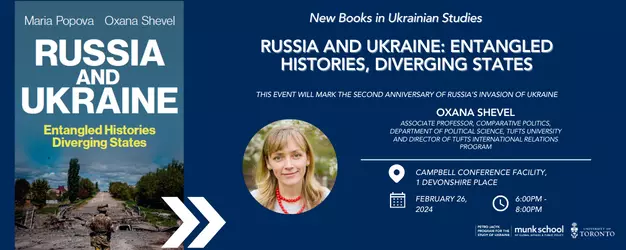
Russia and Ukraine: Entangled Histories, Diverging States
February 26, 2024 | 6:00PM - 8:00PM
|
Online & in-person
This event will take place in-person in the Campbell Conference Facility, Munk School, 1 Devonshire Place, Toronto and online via Zoom
This event will mark the second anniversary of Russia’s invasion of Ukraine
The talk, based on the newly published book, will examine of the root causes of Russia's war against Ukraine. The book explains how since 1991 Russia and Ukraine diverged politically, ending up on a collision course. Russia slid back into authoritarianism and imperialism, while Ukraine consolidated a competitive political system and pro-European identity. As Ukraine built a democratic nation-state, Russia refused to accept it and came to see it as an “anti-Russia” project. After political and economic pressure proved ineffective, and even counterproductive, Putin went to war to force Ukraine back into the fold of the “Russian world.” Ukraine resisted, determined to pursue European integration as a sovereign state. These irreconcilable goals, rather than geopolitical wrangling between Russia and the West over NATO expansion, are essential to understanding Russia’s war on Ukraine.
Oxana Shevel is an Associate Professor of comparative politics at the Department of Political Science at Tufts University and Director of Tufts International Relations program. Her research and teaching focuses on the post-Soviet region, especially Ukraine and Russia, and issues such as nation-building and identity politics, citizenship policies, memory politics, church-state relations, and democratization process in the post-Soviet region. She's the author (with Maria Popova) of a recent book on the root causes of the Russo-Ukrainian war: "Russia and Ukraine: Entangled Histories, Diverging States" (Polity 2023). Her earlier book, "Migration, Refugee Policy, and State Building in Postcommunist Europe" (Cambridge, 2011) won the American Association of Ukrainian Studies (AAUS) prize for best book in the fields of Ukrainian history, politics, language, literature and culture."
Co-Sponsor:
Petro Jacyk Program for the Study of Ukraine
Co-Sponsor:
Centre for European, Russian, and Eurasian Studies